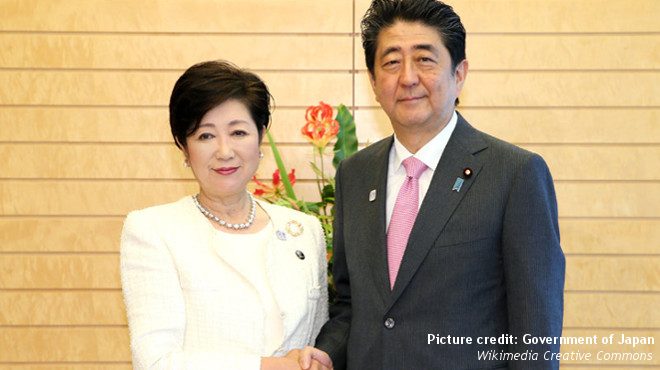Tokyo Elections: implications for Abe

On June 23, election campaigns started for the Tokyo Metropolitan Assembly – the city’s local legislature. The elections, which take place on July 2, are seen as a referendum on Governor Yuriko Koike’s mandate to “clean up Tokyo’s politics”, but also, as a test for Shinzo Abe’s Liberal Democratic Party (LDP) which has experienced declining approval ratings due to both scandals in the spring and after pushing through controversial new legislation.
The stakes are high. If Abe’s ruling party suffers a substantial defeat by the new governor’s party, his position within the LDP becomes uncertain and he could be dislodged from power by internal forces. Further, he risks being challenged later on down the road by Koike’s new political movement.
A Japanese Macron?
Last year, Tokyoites elected former government minister Koike as the prefecture’s first ever female governor. Similar to a more well-known political upset in Europe in the past year, Koike is a politician who broke with her previous party and comfortably won the election as an independent. Now, she is aiming to win support for her policies through her newly established political party: Tokyo Metropolis Residents First Association (abbreviated as Tomin).
As a local political party, Tomin primarily concerns itself with local politics. It lists 13 basic principles on its website, among them reducing kindergarten waiting lists; improving the quality of education; and reforming the way the legislature functions.
Koike’s election as an independent to the governorship and her new Tomin party have upset the traditional political system in Tokyo. Since 1979, Abe’s national coalition partner, Komeito usually supported local LDP candidates. Now, it is allied with Tomin and the two parties divide the districts among themselves and support each other’s candidates.
For these reasons, the race may potentially move beyond local politics and have national implications. Importantly, if the LDP’s Tokyo branch collapses and loses many seats in the Assembly it will be the latest in a series of major setbacks for the Abe government. Daily newspaper polls in June; Yomiuri, Asahi, Mainichi, and Sankei show a neck-and-neck race between the governor’s party and the LDP, with both parties being supported by 23-27 percent of respondents, and on average, Tomin comes out as the favorite.
The danger (at least in the short-term) for Abe will come from inside the LDP. It is unlikely that Koike would campaign at a national level directly after winning local elections. Also, Japan’s main national opposition party, the center-left Democratic Party (DP), has a weak presence (95 out of 475 seats) in the lower house of the National Diet, and is seen broadly as an obstructive party devoid of any real policy of its own. Ahead of the Tokyo elections where 127 seats are up for grabs, it is fielding only 23 candidates, even fewer than the Japanese Communist Party’s 37.
Old faces, new circumstances
The short-term danger to Abe’s hold on the prime ministership is more internal than external. This is almost a tradition in Japan’s postwar politics: threats to power come from rival factions within the LDP. Abe has a longtime adversary in former minister and cabinet member Shigeru Ishiba. Ishiba has recently criticized Abe’s stance that the text of Article 9 should be unrevised and instead a new paragraph should be added to justify the constitutionality of the Self-Defense Forces. He is reportedly considering challenging Abe for the LDP Presidency in September 2018.
Although a loss in Tokyo is not enough to rally party stalwarts against Abe’s reelection as party president, failures build up. Achieving the LDP’s signature policy – constitutional revision – is highly ambitious, requiring both a supermajority in the National Diet and winning a referendum. A continued fall in popularity will make the LDP’s plan all the more difficult. Abe recently stated that he wants a bill to be submitted to the Commissions on the Constitution of both chambers of the National Diet before the end of this year, with a potential referendum in 2018. Abe’s personal convictions on this issue, combined with external pressures will compel him to take action soon. With the 2020 Tokyo Olympics as his deadline for constitutional revision, any loss of momentum due to continued failures might create restlessness within the LDP and could threaten his hold on power.
If Governor Koike is ambitious enough to pursue politics at a national level it could be Abe’s most significant long-term threat. While Koike – a conservative and former LDP minister – does not differ significantly on substance from Abe, her personality as someone who takes on the establishment and upends ‘business as usual’ might be exactly what the electorate wants. With government approval numbers falling and a weak DP unable to fix its image problem – the time could be ripe for a Koike-led insurgent “Japan Residents First Association”.